

eLearning Communities Of Practice: 6 Forms Of Practical Application - eLearning Industry. Communities of practice have long been at the heart of knowledge management and are underpinned by 3 key features: Members share a passion for a particular professional activity.Members strive to learn, apply, and to master that activity.Community members actively share their knowledge with their community.
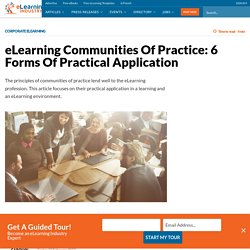
Communities of practice generally operate formally with a leader or leadership group, identified objectives, and an established means of communication. A less structured coalition of like-minded professionals can also operate as effectively as a community of practice, but the best functioning communities are almost always formally structured. Let us see how to practically apply eLearning communities of practice. Faculty Development in the Age of Digital, Connected Learning. Ethos and Practice of a Connected Learning Movement: Interpreting Virtually Connecting Through Alignment with Theory and Survey Results.
Bali, M.
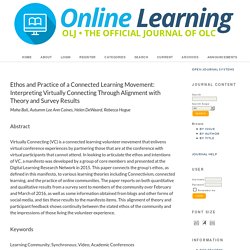
& Hogue, R. (2015, May 8). Virtual, hybrid, or present: The ET4Buddy experiment. Digital Pedagogy Lab. Retrieved from Cormier, D. (2015) Community Learning - Every ‘we’ makes a ‘them’. [blog] Cormier, D. (2008, June 3). Ito M., Gutiérrez, K., Livingstone, S., Penuel, B., Rhodes, J., Salen, K., Schor, J., Sefton-Green, J., & Watkins, C. (2013) Connected learning: an agenda for research and design.
Why Connected Learning (n.d.) Reigeluth, C. Rheingold, H. (1993). Siemens, G. (2005, Jan). Virtually Connected Manifesto. Lessons to Be Learned From Paulo Freire as Education Is Being Taken Over by the Mega Rich. (This is a much expanded version of "Lessons From Paulo Freire," which appeared in a recent issue of The Chronicle of Higher Education.)
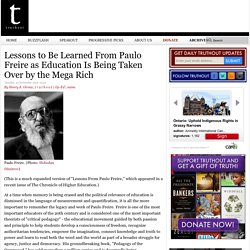
At a time when memory is being erased and the political relevance of education is dismissed in the language of measurement and quantification, it is all the more important to remember the legacy and work of Paulo Freire. Freire is one of the most important educators of the 20th century and is considered one of the most important theorists of "critical pedagogy" - the educational movement guided by both passion and principle to help students develop a consciousness of freedom, recognize authoritarian tendencies, empower the imagination, connect knowledge and truth to power and learn to read both the word and the world as part of a broader struggle for agency, justice and democracy. Public education fares even worse. Paulo offered no recipes for those in need of instant theoretical and political fixes. Edsurge. Sure, technology can transform teaching and learning.
But the sector’s most significant legacy for American schools might have little to do with apps for students—and everything to do with revolutionary organizational designs. In recent years, school reformers, philanthropists, and venture capital investors have placed big bets on blended learning, and edtech professionals have responded with vigor. But as education historian Larry Cuban has noted, the innovative instruction envisioned by edtech advocates remains the exception to the rule—in large part because of the lack of time for teachers to “learn, experiment, and overhaul their practices in collaboration with each other. " Operating within archaic organizational structures, very few of our nation’s teachers have opportunities to incubate and execute ideas prompted by their deep knowledge of students, families, and communities.
This includes ideas about how best to integrate technology. 1. Education in the Digital Era Open Webinar I: "Moving towards Open Educational Practices!! Share your OEP and open the way to other educators to follow your example!" The digital revolution has changed the way we create, use and reuse knowledge.
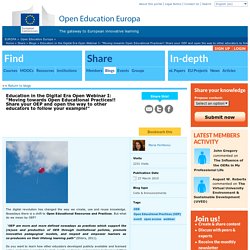
Nowadays there is a shift to Open Educational Resources and Practices. But what do we mean by OEP? “OEP are more and more defined nowadays as practices which support the (re)use and production of OER through institutional policies, promote innovative pedagogical models, and respect and empower learners as co-producers on their lifelong learning path” (Ehlers, 2011). Do you want to learn how other educators developed publicly available and licensed online materials supported by high quality pedagogy and learning technology?
What about the ways that you use Open Educational Resources (OERs) in educational practice? Join our dialogue about the change of educational cultures and the transform of educational practices in schools and HEIs. We will discuss all our findings with you and our guest speakers LIVE during our webinar on April 21st at 18:00 CET. Josie Fraser is a social and educational technologist. CoP: Best Practices. By Etienne Wenger [Published in the "Systems Thinker," June 1998] You are a claims processor working for a large insurance company.

You are good at what you do, but although you know where your paycheck comes from, the corporation mainly remains an abstraction for you. The group you actually work for is a relatively small community of people who share your working conditions. It is with this group that you learn the intricacies of your job, explore the meaning of your work, construct an image of the company, and develop a sense of yourself as a worker.
You are an engineer working on two projects within your business unit. MyiLibrary. Situated%20Learning%20Legitimate%20Peripheral%20Participation%20Learning%20in%20Doing%20Social%20Cognitive%20and%20Computational%20Perspectives%20by%20Etienne%20Wenger%20-%20Youll%20Need%20A%20Light-Heart%20To%20Bear%20The%20Blacksmiths%20Anvil.pdf. MyiLibrary. MyiLibrary. Situated%20Learning%20Legitimate%20Peripheral%20Participation%20Learning%20in%20Doing%20Social%20Cognitive%20and%20Computational%20Perspectives%20by%20Etienne%20Wenger%20-%20Youll%20Need%20A%20Light-Heart%20To%20Bear%20The%20Blacksmiths%20Anvil.pdf. CommunityofPractice.pdf.
The social/situational orientation to learning. The social/situational orientation to learning.
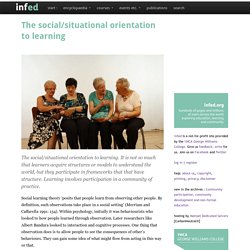
It is not so much that learners acquire structures or models to understand the world, but they participate in frameworks that that have structure. Learning involves participation in a community of practice. Social learning theory ‘posits that people learn from observing other people. By definition, such observations take place in a social setting’ (Merriam and Caffarella 1991: 134). Within psychology, initially it was behaviourists who looked to how people learned through observation.
Learning would be exceedingly laborious, not to mention hazardous, if people ha d to rely solely on the effects of their own actions to inform them what to do. Attending to a behaviour; remembering it as a possible model or paradigm; and playing out how it may work for them in different situations (rehearsal) are key aspects of observational learning. Symbols retained from a modelling experience act as a template with which one’s actions are compared. Jean Lave, Etienne Wenger and communities of practice.
Contents: introduction · communities of practice · legitimate peripheral participation and situated learning · learning organizations and learning communities · conclusion · references · links · how to cite this article Many of the ways we have of talking about learning and education are based on the assumption that learning is something that individuals do.
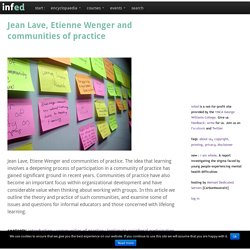
Furthermore, we often assume that learning ‘has a beginning and an end; that it is best separated from the rest of our activities; and that it is the result of teaching’ (Wenger 1998: 3). But how would things look if we took a different track? Communities of Practice (Lave and Wenger) Summary: Etienne Wenger summarizes Communities of Practice (CoP) as “groups of people who share a concern or a passion for something they do and learn how to do it better as they interact regularly.”
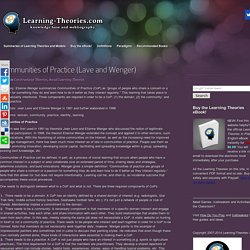
This learning that takes place is not necessarily intentional. Three components are required in order to be a CoP: (1) the domain, (2) the community, and (3) the practice. Originators: Jean Lave and Etienne Wenger in 1991 and further elaborated in 1998. Key Terms: domain, community, practice, identity, learning. 09-10-27-CoPs-and-systems-v2.01.pdf. 1991 Jean Lave - Situating learning in CoPs. Evolution of Wenger's concept of community of practice. Jean Lave, Etienne Wenger and communities of practice. Jean Lave.
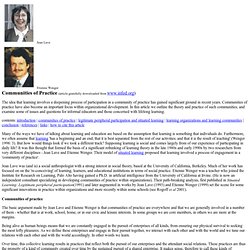
Situated Learning Theory (Lave) HLWIKI Canada.